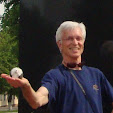We went to a jazz club last night to hear some local musicians pay tribute to three or four American jazz legends. This seemed like a pretty safe bet, because we highly respect the local talent and Belarus can’t generally afford to import the very best foreign talent. (We got burned at the same club one time on a Bossa Nova show. The Brazilian “star” they brought in doesn’t actually perform in Brazil. She’s some sort of functionary in their Ministry of Culture, but here she posed here as a star. We were not impressed.)
We liked last night’s show a lot, but I can’t help commenting on one oddity. Every musical show in Belarus is preceded by an introductory speech. Whereas in the U.S. audience members may read the program notes before listening to a symphony, here everybody gets to listen to some lady who comes out ahead of the conductor and tells us a little about what the orchestra will play. Usually her speeches don’t go on so long that I ever minded, even when I didn’t understand a word, but they’re never as interesting as the erudite notes at the Boston Symphony. Anyway, that’s the deal. You always get a free speech with every concert.
This applies even where Americans don’t expect program notes. At the jazz show, the introductory speech started out pretty well. The master of ceremonies knows a lot about jazz and about the players in the American jazz scene. I forgave his racist assertion that blacks have a genetic disposition giving them an edge in saxophone playing since thoughtless racism happens here all the time. People here simply don’t experience much racial diversity. Anyway, although the introductory speech went on a little long, I forgot about it once the music started.
The speeches became harder to forget, however, when reinforced ever so long-windedly by more of them after every number. I generally stopped listening, but my ears perked up when the M. C. said that a particular piece had drive (драйв). I’ve heard this about some of the music in my dance classes too. In Belarus, it seems, we like to hear music with drive. Translating the word into English, we’re talking about the tenth definition of the noun form of the word in my big Webster’s dictionary. Since that seemed a little obscure, I thought I’d better check a big Russian dictionary. I got out our two-volume monolingual reference and, guess what? It’s not even in there. Music lovers here have appropriated an English word and begun using it regularly in a new way or at least in a context new to me.
I think I’m watching an evolution of the Russian language. Perhaps this one is still slang, but I suspect it’s going mainstream. This kind of thing has been going on for a long time. The French, for example, got the word bistro from the Russians. That’s not exactly how it’s pronounced here, but it means quick. A bistro, of course, offers food simple enough to serve quickly. Once again, a word has evolved into another culture. But anyway, I’m happy to go out to a bistro and listen to music with drive. Why not?




http://goo.gl/SUOcyU
ReplyDeleteLook for the definition over there. That website is by no means encyclopaedic or whatever, but it does explain the word "драйв" as appropriated by russians.
Thanks! That's a really interesting site, but freakin' hard to read. Apparently it's too hip for Google Translate, which mangles it and forces me to use my linguistic, deductive and detective skills to figure out what it's really saying in the original. Очень полезно. Ещё раз, спасибо.
Delete